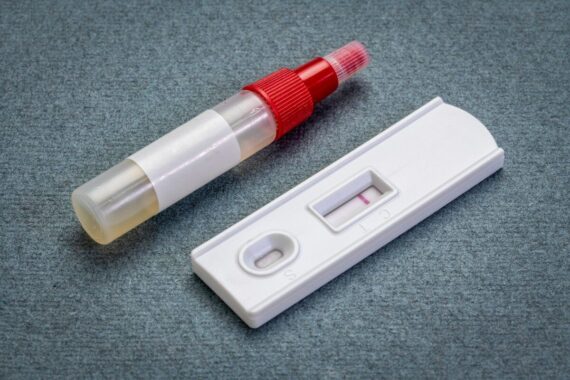NICE expected to update bowel cancer guidance to incorporate FIT triage

Exclusive NICE is expected to update its bowel cancer referral guidelines in the Autumn to incorporate triage with FIT testing, Pulse has learned.
It follows new guidance from the Association of Coloproctology of Great Britain & Ireland (ACPGBI) and the British Society of Gastroenterology (BSG) last year advising GPs to downgrade some urgent colorectal cancer referrals based on new FIT thresholds.
The recommendations, published in June, said that FIT tests should be used as a triage tool, with patients testing below fHb 10μg Hb/g not referred via the urgent cancer pathway even if their symptoms fulfil NICE criteria.
This was followed in October by a letter from NHS England which said GPs should implement the ACPGBI/BSG recommendations in full as part of advice and guidance pathways.
Patients with a FIT of fHb <10μg Hb/g, a normal full blood count and no ongoing clinical concerns’ should not be referred on a lower GI urgent cancer pathway but should be ‘managed in primary care or referred on an alternative pathway’, NHS England said.
Speaking with Pulse, Claire Coughlan, clinical lead at Bowel Cancer UK, said NICE guidance was being updated to ‘incorporate’ the BSG recommendations although it was not yet clear exactly what it would say.
She said GPs had told her that having two different guidelines was ‘unhelpful’.
‘NICE will need to clarify what happens to patients where FIT is below the threshold but they still have concerns. We’re hoping that’s what is going to come out of this. That it will be clearer.’
A protocol document for the NICE review states: ‘Doctors have noticed that most of the people with high-risk symptoms who are sent for a specialist appointment do not have cancer and did not need an urgent colonoscopy.
‘For these reasons, it is important that only the people most likely to have colorectal cancer are selected to be seen within two weeks. This could then mean that they get the treatment they need quickly, and people with other bowel conditions can also be seen more quickly.’
The committee will look at how many people were correctly and incorrectly identified by a FIT test and how the threshold (value) used to define a positive test affect how many people are sent for colonoscopies, how many cancers missed and delayed, and the impact on waiting times, it said.
A spokesperson for NICE said: ‘I can confirm the expected publication of our diagnostic guidance for FIT tests is due to publish later this year, expected November 2023.
‘Depending on the recommendations produced by the above guidance, we would then update our suspected cancer: recognition and referral guidance.’
Last year when NHS England wrote to clinicians to tell them to adopt the new guidelines it told trusts: ‘The BSG/ACPGBI FIT guidance recommends GPs take responsibility for managing those with a FIT fHb <10μg Hb/g and no ongoing clinical concerns in primary care.
‘Secondary care should make sure systems are in place for GPs to easily access advice and guidance to inform their referral decision.’
But it also suggested that where GPs had referred patients below the threshold because of clinical concerns, secondary care teams could send them back to primary care without further tests if they do not agree.
The letter that was sent to GPs and PCNs recommended that clinical teams should also ‘consider’ safety netting via:
Visit Pulse Reference for details on 140 symptoms, including easily searchable symptoms and categories, offering you a free platform to check symptoms and receive potential diagnoses during consultations.
Related Articles
READERS' COMMENTS [3]
Please note, only GPs are permitted to add comments to articles










Key is expanding what is meant by “ongoing clinical concerns”
Also these need safety netted too & a challenge in current climate??
Also what happened to areas need double -ve FIT to mean a true -ve??
We won’t mention the practicalities of getting patients to both do & return successfully with a decent response time for result.
The studies on fit show that it is not 100% reliable.
and that is within studies where participants are selected and supported…
Just wonder where we go with patients who have negative FIT, we don’t send or we try and advice and guidance and referral rejected by secondary care, later Turn out to have cancer, will secondary care answer to their response or is it all on us?
Secondary care cannot reject a referral if we make one.